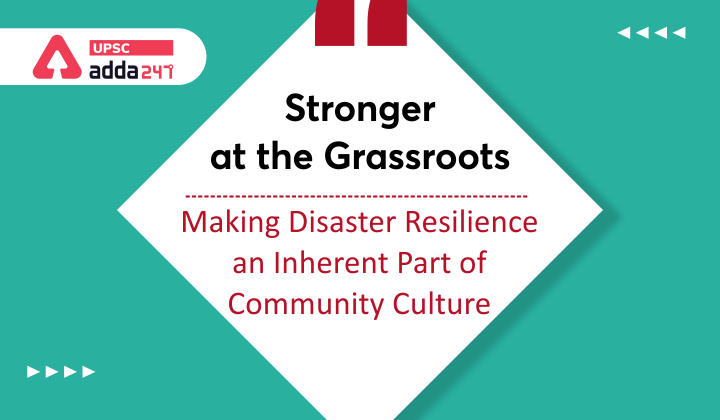Table of Contents
Stronger at the Grassroots- Relevance for UPSC Exam
- GS Paper 2: Indian Constitution- Devolution of powers and finances up to local levels and challenges therein.
- GS Paper 3: Disaster Management- Disaster and disaster management.
Stronger at the Grassroots- Background
- The system of local self-governance, where people in the villages participate in the decision-making process, is the backbone of democracy.
- In this context, it is imperative to make disaster resilience an inherent part of community culture.
Gaming Disorder-Definition, Causes and Associated Impacts
Stronger at the Grassroots- Panchayati Raj System in India
- Background: The Panchayati Raj was first adopted by Nagaur in Rajasthan on October 2, 1959. The Panchayati Raj has vastly expanded over time.
- There are now 2,60,512 Panchayati Raj Institutions (PRIs) represented by about 31 lakh elected members across India
- Gram Sabha: Gram sabhas act as a sounding board for diverse ideas and opinions. They provide a platform to build consensus and make resolutions in the community’s interest.
- Initiatives taken by the government: In order to strengthen the system of gram sabha and institution of Panchayati Raj, the government has introduced the following schemes-
- The People’s Plan Campaign and
- Vibrant Gram Sabha Dashboard
Recognizing Altruism- Good Samaritan Laws
Stronger at the Grassroots- COVID 19 and role of Panchayati Raj Institutions (PRIs)
- Importance of PRIs in disaster Management: When the traditional top-down disaster response system was compromised during the covid-19 pandemic, it was PRIs that played a remarkable role.
- PRIs helped reduce risks, responded swiftly and thus helped people recover quickly by providing essential leadership at the local level.
- PRIs performed both regulatory and welfare functions. For instance-
- During the nationwide lockdown, PRIs set up containment zones, arranged transport, identified buildings for quarantining people and provisioned food for the incoming migrants.
- Effective implementation of welfare schemes like MGNREGA and the National Rural Livelihood Mission quickened the pace of recovery while ensuring support to the vulnerable population.
- Organized community-based surveillance systems involving village elders, the youth and self-help groups (SHGs) to keep a strict vigil in quarantine centers and monitor symptoms in households.
- Their role in mobilizing citizens for COVID-19 vaccination is exemplary.
- Role of Gram Sabha:
- Organized regular engagement with frontline workers like ASHA workers and Anganwadi workers through committees.
- It also bridged the trust gap between the community and the officials.
DRDO Dare to Dream 2021 and Young Scientists awards
Stronger at the Grassroots- Way forward
- The Yokohama strategy: it was formulated during the International Decade for Natural Disaster Reduction in May 1994
- It emphasized that it is important to focus on disaster prevention, mitigation and preparedness rather than disaster response alone, to reduce vulnerability.
- Building capacities of PRIs:
- include disaster management chapters in Panchayat Raj Acts and make disaster planning and spending part of Panchayati Raj development plans and local-level committees.
- This will ensure citizen-centric mapping and planning of resources.
- Various insurance products customized to local needs will build the financial resilience of the community.
- include disaster management chapters in Panchayat Raj Acts and make disaster planning and spending part of Panchayati Raj development plans and local-level committees.
- Community-based disaster management plans: This would help as the community is usually the first responder in case of a disaster.
- These would provide a strategy for resource utilization and maintenance during a disaster.
- Such plans should tap the traditional wisdom of local communities which will compliment modern practices.
- Financial contributions from the community should be encouraged through the establishment of community disaster funds in all gram panchayats.




 TSPSC Group 1 Question Paper 2024, Downl...
TSPSC Group 1 Question Paper 2024, Downl...
 TSPSC Group 1 Answer key 2024 Out, Downl...
TSPSC Group 1 Answer key 2024 Out, Downl...
 UPSC Prelims 2024 Question Paper, Downlo...
UPSC Prelims 2024 Question Paper, Downlo...
